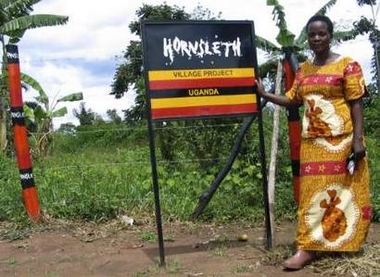Pig-for-name sparks ire
(Reuters)Updated: 2006-11-21 13:57
BUTEYONGERA, Uganda - A Danish artist has stirred up controversy by giving Ugandan villagers free goats, sheep and pigs - but on the condition that they adopt his name.
 A villager, who benefited from Hornsleth's project, stands next to a sign for the Uganda Village Project in Buteyongera, near Kampala, November 19, 2006. [Reuters]  |
Hornsleth launched an exhibition in Copenhagen Friday of the project. The 108 photos of people holding up their new "identity cards" in the red, yellow and black of Uganda's flag with the name "Hornsleth" are meant to comment on conditions Western donors attach to aid.
"It's a remark about hypocrisy, about Western and Third World relations," Hornsleth told Reuters.
But in Uganda, Ethics and Integrity Minister James Buturo denounced it as racist.
"It's illegal and insulting," Buturo told Reuters. "He claims one animal can get them out of poverty, which is a lie. Then they have to take his name?"
"We know about donors and aid," he said. "But these methods are evil and satanic."
With its hilly green surroundings, rows of banana plants and chickens darting between thatched huts, Buteyongera, in central Uganda, could be any Ugandan village.
Only the big "Hornsleth" sign and pig pens fenced in with wooden poles inscribed with Hornsleth's name give it away.
George Sabadu Hornsleth is grateful for the pig he got.
"I never had a pig, I was jobless apart from some land," the 46 year-old said.
"Africans adopting European names for gifts - that's nothing new. We've been doing that since colonial times. Why do you think I'm called George?"
Hornsleth said approaching subjects was easy.
"They said to me: 'We get a pig? Great'," he said. "So I explained the exhibition. They said 'yeah, yeah, yeah, but give me the pig. We're poor."
"We don't care about his idea, the art, we care about the benefits," said David Sendulya Hornsleth, 29. "We can have a hundred new names if each brings us further out of poverty."
|
||
|
||
|
|